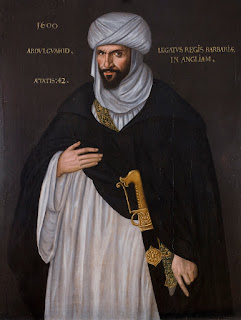 Staff review by Chris Saliba
Staff review by Chris SalibaThe story of how a politically shrewd Queen Elizabeth tried to build military and trade alliances with the Islamic world.
Elizabeth I reigned from 1558 until her death in 1603, an amazing forty-five year stretch of power. She is a figure central to English history, a political maverick who saw off Spanish attempts at invasion. What is perhaps less known is her wheelings and dealings with the Islamic world, most notably the Ottomans and Moroccans.
Religion at this time was just as much about politics as it was about faith. England was grappling with the devastating divisions between Catholics and Protestants. Elizabeth was Protestant, but a majority of the country remained Catholic. Sectarian violence often led to massacres and hideous executions. To be suspected of the wrong religious allegiance could mean your life was at risk. The major international conflict for Protestant England was with Catholic Spain. All energies were marshalled to see off the Catholic menace.
Just like in our own time, political allegiances and enmities wove a complex web. Religion made things even more beguiling. Elizabeth tried to establish a power bloc against the Spanish by cultivating diplomatic ties with the Islamic Ottomans and Moroccans, sending out trade missions and bribing rulers with all sorts of lavish gifts. English officials, diplomats and royal advisers would reason that Protestant Christians had more in common with Muslims than the hated Catholics. For example, Islam shared the Protestant ban on material representations of god and the prophets. The English made all sorts of convoluted arguments, full of hypocrisy and delusion, in order to try and get Islamic military assistance to fight Catholics. Indeed, Elizabeth would help arm Muslims:
With the queen's sanction, Protestant English merchants were removing metal from ecclesiastical buildings - including lead roofing and bell metal - and shipping it to Constantinople to arm Muslims fighting against Catholics.
Elizabeth also formed a military alliance with Morocco to defeat Spain with a pre-emptive strike on Cadiz in 1596.
The English public knew a fair degree about these political shennanigans. Figures like Muhammad al-Annuri, the Moroccan ambassador who arrived in London in 1600, made many public appearances. His swarthy good looks, seen in an official portrait, make him look like a model for Othello. As Jerry Brotton writes, Shakespeare probably started to write Othello six months after al-Annuri's arrival.
Muhammad al-Annuri (1600; Unknown artist)
Public attitudes to Muslims came through in the theatre, most notably in the plays of Shakespeare and Christopher Marlowe (and in lesser figures such as Thomas Kyd and Thomas Dekker). A substantial chunk of This Orient Isle is devoted to a fascinating interpretation of these plays, culminating in Shakespeare's Othello. What Brotton finds is that the theatre reflected the deeply ambivalent views the public held towards the Muslim world, often willfully misinterpreting Islam and its scriptural beliefs. Othello himself, while nominally Christian, is an unsettlingly mysterious character: did he start life as a Muslim, or a pagan, then convert? We're not sure. Brotton writes that Othello is a "profoundly ambivalent figure who embodies so much of Elizabethan England's contradictory relations to the Islamic World."
Indeed, while Elizabeth was sending out proclamations expelling "blackamoors and negroes" from the realm, she was secretly negotiating alliances with the Moroccans. As happens today, when one's political fortunes are sliding (as were hers at the time), spreading xenophobia is a useful trick.
This Orient Isle is full of rigorous scholarship, fascinating critical interpretation and enlightening history. Jerry Brotton shows how, while much has changed in 400 years, a lot has also remained the same.
This Orient Isle: Elizabethan England and the Islamic World, by Jerry Brotton. Published by Penguin. ISBN: 9780141978673 RRP: $24.99
To sign up for our monthly newsletter, featuring new releases, book reviews and favourite articles from around the web, click here.

No comments:
Post a Comment